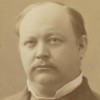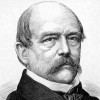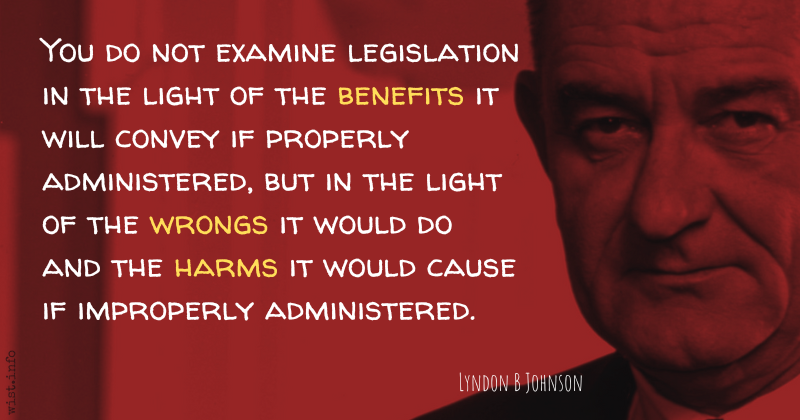You can’t always come up with the optimal solution, but you can usually come up with a better solution. A good compromise, a good piece of legislation, is like a good sentence. Or a good piece of music. Everybody can recognize it. They say, “Huh. It works. It makes sense.” That doesn’t happen often, of course, but it happens.
Barack Obama (b. 1961) American politician, US President (2009-2017)
Quoted in William Finnegan, “The Candidate,” The New Yorker (31 May 2004)
(Source)
While a state senator in Illinois.
Quotations about:
legislation
Note not all quotations have been tagged, so Search may find additional quotes on this topic.
Our legislators are not sufficiently apprised of the rightful limits of their powers: that their true office is to declare and enforce only our natural rights and duties, & to take none of them from us. No man has a natural right to commit aggression on the equal rights of another; and this is all from which the laws ought to restrain him: every man is under the natural duty of contributing to the necessities of the society; and this is all the laws should enforce on him.
Thomas Jefferson (1743-1826) American political philosopher, polymath, statesman, US President (1801-09)
Letter to Francis W. Gilmer (7 Jun 1816)
(Source)
It will be of little avail to the people, that the laws are made by men of their own choice, if the laws be so voluminous that they cannot be read, or so incoherent that they cannot be understood; if they be repealed or revised before they are promulgated, or undergo such incessant changes that no man, who knows what the law is today, can guess what it will be tomorrow.
There is but one way for a president to deal with Congress, and that is continuously, incessantly, and without interruption. If it is really going to work, the relationship has got to be almost incestuous. He’s got to know them better than they know themselves. And then, on the basis of this knowledge, he’s got to build a system that stretches from the cradle to the grave, from the moment a bill is introduced to the moment it is officially enrolled as the law of the land.
Lyndon B. Johnson (1908-1973) American politician, educator, US President (1963-69)
Comment to Doris Kearns Goodwin
(Source)
Quoted in Doris Kearns Goodwin, Lyndon Johnson and the American Dream, ch. 8 "The Great Society" (1976). Kearns was an intern and staff member in the Johnson White House, and worked with him on his memoirs.
The period of Prohibition — called the noble experiment — brought on the greatest breakdown of law and order the United States has known until today. I think there is a lesson here. Do not regulate the private morals of people. Do not tell them what they can take or not take. Because if you do, they will become angry and antisocial and they will get what they want from criminals who are able to work in perfect freedom because they have paid off the police.
Laws, like sausages, cease to inspire respect in proportion as we know how they are made.
Otto von Bismarck (1815-1898) Prussian statesman
(Misattributed)
This and variants are attributed to Bismarck (no earlier than the 1930s), as well as to Kaiser Wilhelm, Benjamin Disraeli, and French statesman Honoré Gabriel de Riqueti. Variations on this theme were popular in late 19th Century America.
The precise wording above is attributed to Vermont lawyer and author John Godfrey Saxe, in University Chronicle, University of Michigan (27 Mar 1869).
Variants (usually cited to Bismarck):
- "If you like laws and sausages, you should never watch either one being made."
- "Laws are like sausages — it is best not to see them being made."
- "Laws are like sausages. It is better not to see them being made."
- "Laws are like sausages. You should never see them made."
- "Laws are like sausages. You should never watch them being made."
- "Law and sausage are two things you do not want to see being made."
- "No one should see how laws or sausages are made."
- "To retain respect for sausages and laws, one must not watch them in the making."
- "The making of laws like the making of sausages, is not a pretty sight."
- "Je weniger die Leute darüber wissen, wie Würste und Gesetze gemacht werden, desto besser schlafen sie nachts." [The less the people know about how sausages and laws are made, the better they sleep in the night.]
And now bills were passed, not only for national objects but for individual cases, and laws were most numerous when the commonwealth was most corrupt.
[Corruptissima re publica plurimae leges.]
It may be true that morality cannot be legislated, but behavior can be regulated. It may be true that the law cannot change the heart but it can restrain the heartless. It may be true that the law can’t make a man love me, but it can restrain him from lynching me, and I think that’s pretty important also.
Martin Luther King, Jr. (1929-1968) American clergyman, civil rights leader, social activist, preacher
“The Other America,” speech, Stanford University (14 Apr 1967)
(Source)
A motif King used frequently. In the Wall Street Journal (13 Nov 1962), King used the line, "It may be true that the law cannot make a man love me, but it can keep him from lynching me, and I think that's pretty important." In Strength to Love, 3.3 (1963), he wrote, "Morality cannot be legislated, but behavior can be regulated. Judicial decrees may not change the heart, but they can restrain the heartless."
The true rule, in determining to embrace, or reject any thing, is not whether it have any evil in it; but whether it have more of evil, than of good. There are few things wholly evil, or wholly good. Almost every thing, especially of governmental policy, is an inseparable compound of the two; so that our best judgment of the preponderance between them is continually demanded.
Abraham Lincoln (1809-1865) American lawyer, politician, US President (1861-65)
Remarks, House of Representatives (1848-06-20)
(Source)
Speaking on internal improvements (infrastructure) as part of governmental policy.
There is no surer way to misread any document than to read it literally; in every interpretation we must pass between Scylla and Charybdis; and I certainly do not wish to add to the barrels of ink that have been spent in logging the route. As nearly as we can, we must put ourselves in the place of those who uttered the words, and try to divine how they would have dealt with the unforeseen situation; and, although their words are by far the most decisive evidence of what they would have done, they are by no means final.
Learned Hand (1872-1961) American jurist
Guiseppi v. Walling, 144 F.2d 608, 624 (2d Cir. 1944) [concurring]
(Source)
You do not examine legislation in the light of the benefits it will convey if properly administered, but in the light of the wrongs it would do and the harms it would cause if improperly administered.













